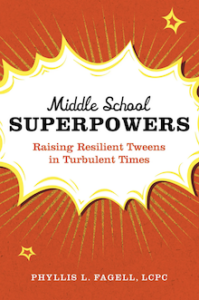Help Tweens Develop Resilience Superpowers
Middle School Superpowers: Raising Resilient Tweens in Turbulent Times
By Phyllis L. Fagell, LCPC
(Hachette Books, 2023 – Learn more)
Reviewed by Anne Anderson

After citing some alarming statistics on cyberbullying, social media, and mental health, the author (a professional school counselor) shares “dozens of practical, evidence-based ways to help your child develop the following 12 middle school superpowers.” (p. 20)

Here are some key points I gleaned from each superpower. No doubt readers will find ideas that resonate with them and their tweens.
1. Super Flexibility: The Power to Manage Change and Uncertainty
Middle schoolers need their adults “to be reassuring and calm in a crisis.” (p.26) Unfortunately, we cannot make everything right; however, we can help them reevaluate a situation, provide them with accurate information, and stay positive. Included in this chapter are numerous stories of flexibility during and immediately following the pandemic.
2. Super Belonging: The Power to Find Your Place and Make Strong Connections
Wow! This is a biggie for middle schoolers: developing social skills, finding new friends when they’ve been dumped, connecting with adults, wanting to be more popular, and the list goes on and on.
Fagell reminds adults not to be the problem solver. Here’s why: “If you deprive them of opportunities to learn how to navigate relationship ups and downs now, they won’t learn that they can get through these painful moments – even grow and learn from them.” (p.41) Tweens need direction to acquire and bolster social skills (e.g., making eye contact, interpreting nonverbal cues, putting down the phone, and asking questions). After all, these are skills they will need as adults!
This chapter includes an outstanding Idea for Educators on addressing awkwardness and building community.
3. Super Sight: The Power to Anticipate Problems and Make a Plan
This conversation snippet from page 61 is so typical:
Sixth-grade girl #1: “We need to talk to you about a friend problem that started this morning.”
Sixth-grade girl #2: “Actually, it started five years ago. Should we start at the beginning?
The author goes on to suggest strategies for guiding students through friendship drama, minimizing conflict with teachers, and developing problem-solving skills when faced with situations involving drugs, sex, or sexting.
4. Super Vulnerability: The Power to Know When and How to Ask for Help
“Given the spike in mental health conditions among tweens and the high stakes, Super Vulnerability is a critical superpower and a key part of resilience.” (p.79) Therefore, it is important to help students get the right kind of support as well as know when and how to seek help for a friend.
5. Super Bounce: The Power to Learn and Recover from Missteps
Recovering from a poor choice (e.g., cheating, skipping class, stealing, or being disrespectful) or becoming the target of bullying or gossip can be devastating to a tween. This chapter includes specific actions to help students repair relationships and to understand the implications of their behavior. Educators will find an excellent idea for turning students’ mistakes into teachable moments.
6. Super Agency: The Power to Find Your Purpose and Take Initiative
Suggestions for acquiring this superpower include talking about their strengths and things they can control as well as issues they feel strongly about. Help them look for opportunities to serve others since volunteering helps young people “gain perspective, find purpose, and get to experience the ripple effects of their actions.” (p.120)
7. Super Forcefield: The Power to Set Healthy Boundaries
As students set healthy boundaries, they learn how to protect their time. Since this is life skill, they must learn to say “NO” and resist the pressure to be everything to everybody. Included in this chapter are some phrases to use when helping young people practice self-preservation.
8. Super Security: The Power to Take Pride in Your Identity and Step into Someone Else’s Shoes
Chapter 8 is more “about helping kids embrace being different than what specifically makes them different.” (p.140) Youngsters who experience bullying related to their physical appearance, gender or sexual identity, or financial status can especially benefit from the strategies suggested by the author.
9. Super Healing: The Power to Cope and Self-Regulate Emotions
The ability to manage or navigate the perils of middle school is overwhelming…for tweens and their parents. Keep the lines of communication open! Do they just need to vent? Do they need advice? Above all, be prepared; they know how to push all your buttons. Best advice from this chapter: Know when to seek professional help.
10. Super Balance: The Power to Set a Reasonable Pace and Realistic Goals
Any adult who has ever dealt with a child who can’t “get started” needs the strategies in this superpower.
11. Super Daring: The Power to Go Out on a Limb and Take Smart Risks
For me, the key word is smart! For me, the key strategy is “start with ‘starter risks’ and small exposures.” (p. 207)
12. Super Optimism: The Power to Find Hope and Humor in the Hard Stuff
This is a major life skill. “For a middle schooler with minimal life experience or perspective, it’s hard to let stuff go.” (p. 221) A person who possesses this superpower will be able to navigate life easier.
As adults we know life can be difficult. Middle School Superpowers walks parents and educators through twelve superpowers to assist young people in navigating life in middle school and beyond. Forewarned is forearmed!
Anne Anderson always knew she wanted to be a teacher. She graduated from East Texas Baptist University with an English major and History minor and did graduate work at Louisiana State University and Louisiana Tech University. After teaching 8th graders for 24 years, Anne served as a content coach. Since retiring in 2011, Anne has worked as an educational consultant, presenting at national conferences and onsite trainings for public and private schools.
Calendar Celebrations: September, October, November is part of Anne Anderson’s trilogy on quick, engaging activities and resources for months of the school year. (For MiddleWeb she wrote about back to school and fall resources here.) Anne has also published articles in IDEAS Plus and Voices from the Middle, publications of the National Council of Teachers of English. She is a frequent reviewer of professional books for MiddleWeb.com.


































